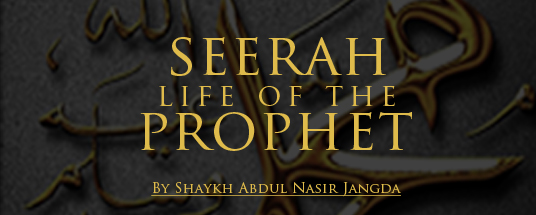3-27-2013
Episode 40: The Prophet, Utba bin Rabi’ah & Surah Fussilat
Welcome to Seerah Pearls, which aims to highlight some tantalising learning points from each episode of the Seerah- Life of the Prophet (sallallahu alayhi wasallam).
Encounter with Utbah bin Rabi’ah
A famous conversation occurred between the Prophet (sallallahu alayhi wasallam) and a key opponent of his: Utbah bin Rabi’ah. The incident occurred at the end of the 3rd/beginning of the 4th year of Prophethood. Utbah was a Qurayshi leader, who was very wealthy, politically influential and well-travelled. He had stood in the courts of all the major Kings of that time e.g. Rome and Abyssinia. The Quraysh formed a council to decide who would be best able to recognise a poet, magician or insane person, as they felt the Prophet (sallallahu alayhi wasallam) had divided the community and belittled their way of life. They identified Utbah bin Rabi’ah as the man for the job.
Utbah asked the Prophet (sallallahu alayhi wasallam) if he felt he was better than their forefathers. If yes, then they also worshipped the idols. If no, then he wanted to hear what the Prophet (sallallahu alayhi wasallam) had to say for himself. Utbah commented that they had never seen anyone cause more of a headache for their people than him. Utbah mentioned that the Quraysh were about to raise swords to deal with the situation, but he did not want it to get to that: he offered the Prophet (sallallahu alayhi wasallam) the best of wealth, women and status. Throughout Utbah’s tirade, the Prophet (sallallahu alayhi wasallam) remained silent. Asking if Utbah was done, he commenced:
In the Name of Allah, the Beneficent, the Most Merciful
41:1 Ha, Meem.
41:2 [This is] a revelation from the Entirely Merciful, the Especially Merciful –
41:3 A Book whose verses have been detailed, an Arabic Qur’an for a people who know,
41:4 As a giver of good tidings and a warner; but most of them turn away, so they do not hear.
41:5 And they say, “Our hearts are within coverings from that to which you invite us, and in our ears is deafness, and between us and you is a partition, so work; indeed, we are working.”
41:6 Say, O [Muhammad], “I am only a man like you to whom it has been revealed that your god is but one God; so take a straight course to Him and seek His forgiveness.” And woe to those who associate others with Allah –
41:7 Those who do not give zakah, and in the Hereafter they are disbelievers.
41:8 Indeed, those who believe and do righteous deeds – for them is a reward uninterrupted.
41:9 Say, “Do you indeed disbelieve in He who created the earth in two days and attribute to Him equals? That is the Lord of the worlds.”
41:10 And He placed on the earth firmly set mountains over its surface, and He blessed it and determined therein its [creatures’] sustenance in four days without distinction – for [the information] of those who ask.
41:11 Then He directed Himself to the heaven while it was smoke and said to it and to the earth, “Come [into being], willingly or by compulsion.” They said, “We have come willingly.”
41:12 And He completed them as seven heavens within two days and inspired in each heaven its command. And We adorned the nearest heaven with lamps and as protection. That is the determination of the Exalted in Might, the Knowing.
41:13 But if they turn away, then say, “I have warned you of a thunderbolt like the thunderbolt [that struck] ‘Aad and Thamud.
Utbah started screaming, ‘Please stop, please stop! Is there not anything else you could say to me apart from this?’ The Prophet (sallallahu alayhi wasallam) replied no, and that this was his message. Another narration reports that Utbah placed his hand on the mouth of the Prophet (sallallahu alayhi wasallam), asking him to stop. Utbah himself expressed fears that the punishment that the Prophet (sallallahu alayhi wasallam) was speaking of would descend upon him there and then.
When returning to the Quraysh after this conversation, the people noted he looked different, terrified. Utbah confirmed that Muhammad (sallallahu alayhi wasallam) had never lied; despite travelling and meeting the greatest soothsayers, speakers and magicians, Utbah said what he heard from the Prophet (sallallahu alayhi wasallam) was nothing like these, and that it was not from this Earth. The Quraysh were disheartened with the outcome and turned away.
Abu Jahl came to help with damage control of the situation. He said to Utbah that the people fear that he had forsaken their religion and were offering a gift of money i.e. a bribe. Utbah was wealthier than everyone, so the bribe was of no use. Abu Jahl encouraged him to at least say something against the Prophet (sallallahu alayhi wasallam), otherwise the people would reject him and his accomplishments would disappear. Utbah was not sure what to say, as he had seen the light in the words of the Prophet (sallallahu alayhi wasallam), commenting on their sweetness and soothing nature. Utbah asked to be left alone to consider his excuses. After realising the material things at stake, he forwarded the excuse to the Quraysh that the magic done by the Prophet (sallallahu alayhi wasallam) messes with your head: this was not simple magic. Utbah had to seclude himself as he overcame its effects, but he was strong enough to do so, unlike the Prophet’s (sallallahu alayhi wasallam) followers.
The Prophet (sallallahu alayhi wasallam) was distraught, and Allah revealed as reassurance:
74: 11 Leave Me with the one I created alone
74:12 And to whom I granted extensive wealth
74:13 And children present [with him]
Things would now take a turn for the worse: torture and oppression would become the Quraysh policy against the Muslims.
Podcast: Play in new window | Download
Subscribe: RSS

